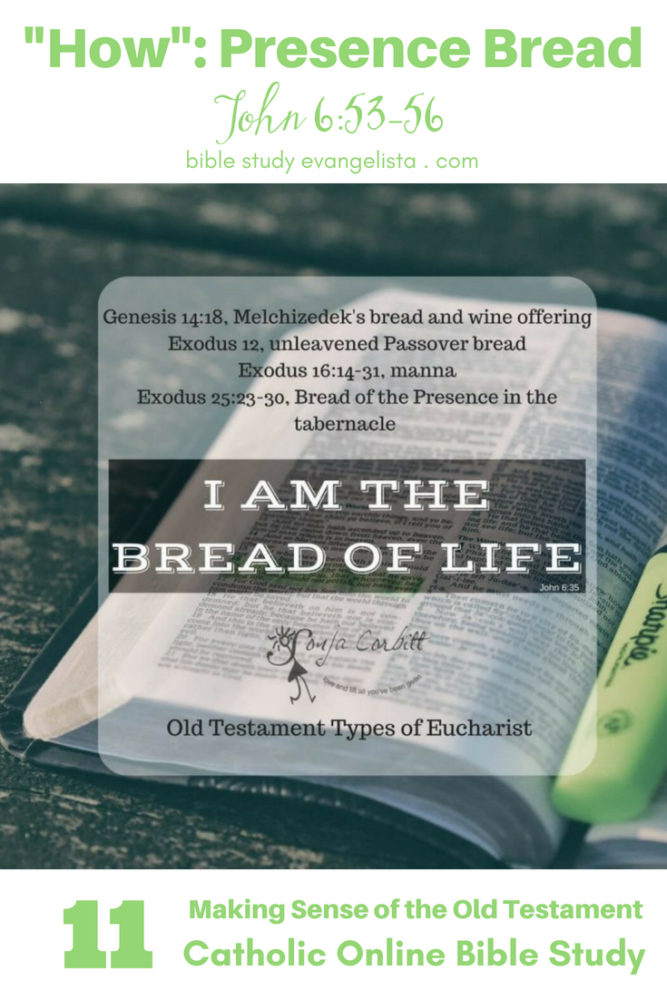The fulfillment and interpretation of all Old Testament things, Jesus is present in the Eucharist. He feeds us; we can live forever with God by becoming one with, eating, this new Bread of the Presence.

Thank you, Friends of the Show, for loving and lifting me :)
LOVE the Word™ is a Bible study method based on Mary’s own practice: lectio without the Latin.
L – Listen (Receive the Word.)
O – Observe (Choose one or more of the following personality approaches to connect the passage to your life and recent events.)
F | Franciscan – Bake bread or make a special meal for someone you love or for a neighbor.
I | Ignatian – Choose one of the references below (under Notes and References) and place yourself in the situation. What do you hear, see, feel, smell?
A | Augustinian – How has God called you through this show to be broken bread and spilled out wine for others today and this week?
T | Thomistic – Memorize the types of Old Testament bread listed below.
V – Verbalize (Pray about your thoughts and emotions.)
Remembering that He loves you and that you are in His presence, talk to God about the particulars of your O – Observe step. You may want to write your reflections in your LOVE the Word journal. Or get a free journal page and guide in the right-hand margin.
E – Entrust (May it be done to me according to your word!)
Lord God, giver of bread, there can be no famine while the bread of Heaven endures, and help us to remember that when we are forgetful of Your infinite kindness. As we eat of the bread of Heaven we shall continue to prosper on earth. Kind Lord, feed me until I shall want no more. Amen +
.
*LOVE the Word™ exercises are offered according to FIAT: the four personalities, or “prayer forms,” explored in Prayer and Temperament, by Chester Michael and Marie Norrisey: Franciscan, Ignatian, Augustinian, and Thomistic: FIAT! These prayer forms correspond to the Myers-Briggs personality types.
Notes and References
Exodus 25:23-30, Table of “presence bread,” also translated “bread of the Face”; “bread of propitiation”; “loaves of setting forth”; or “showbread.” Directly across from the golden lampstand in the tabernacle sanctuary, outside the holy of holies, it was a crowned, gold table, set to the right.
Leviticus 24:5-9, 12 loaves of Presence Bread on the table for 12 tribes, a communal offering rather than a sacrificial one. Because the bread belonged to God, it was to be eaten by the priests every Sabbath “in the sacred place,” the sanctuary, as they replaced the previous week’s bread with fresh each week. Along with the bread, there were also offerings of incense, wine and oil.
Other “types” of Old Testament bread
Genesis 14:18, The first priest in the scriptures, Melchizedek, offers bread and wine
Exodus 12, unleavened Passover bread
Exodus 16:14-31, manna, “bread from heaven”; angels’ food “suited to each man’s taste” (Wis 16:20-21).
The Eucharist – the anti-type of all Old Testament breads
Matthew 4:4, Jesus quotes Deuteronomy 8:3, “Man does not live by bread alone, but by the word of God.” As a spiritual being, man cannot live only in the physical realm.
John 6, Jesus teaches on the Eucharist before He institutes it for the first time, “I am the bread of life.”
John 6:63, “the spirit gives life, flesh profits nothing.” Jesus means our flesh, not His flesh, which gives eternal life (John 6:54). The “spirituality” of the teaching does not make it merely symbolic. To be spiritual does not necessitate a “symbolic” meaning. In fact, in this case the exact opposite is true, according to Jesus in this chapter.
Episode Resources
Ignite, Chapters 6 & 7, The How of the Bible
Read the Transcript
You can download a complete, word-for-word transcript.
Protected Content. Click Here to sign in
Courtesy of Kristie Hynniman who does our transcriptions for you.
___
Image: https://unsplash.com/@aaronburden



It’s funny Sonja, as a convert you discover anew with fresh eyes the reality that we as cradle Catholics have grown accustomed to: the sacramental meaning of the liturgy prefigured in the OT and all that comes with that: the priesthood, the Eucharist, Mass, confession; the sacraments. But what you are also doing for me is shining light on what is missing from contemporary Catholic life that protestants embody: passion and love for the scriptures, the common priesthood (I thought this is where the understanding comes about the common priesthood, That’s why I have a share in it, we now eat the Bread that was reserved for the priests!), missionary zeal, a desire to witness to others, fellowship, joyful praise…etc. I think of our separated brethren as missing members of the family. Absent members that aren’t sharing the family meal. We are children of divorced parents that love each other but can’t live together. We can’t have Thanksgiving dinner together!!
But we need each other! We are gifts to each other that must be shared in common! Members of the same body of Christ. And things won’t be quite right until we’re all back together united and living in the same house. Loving and adoring the Father, together serving Him and each other at the same Eucharistic table! My daily prayer is Jesus’own prayer that we would be one as He and the Father are one in the Most Holy Trinity!! I pray it will be so and I hope others will pray for it too! That the world may believe that the Father sent Jesus to save us because of His deep abiding love for each one of us. ❤
That is also my daily prayer and call.
God’s perpetual provision in the Eucharist. I will carry that with me. Amen
What a profound grace we have been given that God so loves us and so desires to feed and join Himself to us that He becomes our food. Eternity isn’t long enough to thank Him.
Wonderful podcast! And wonderful series!
Reminded me of Edward Sri’s CD “The Jewish Roots of the Eucharist.”
I was surprised you mentioned the idea that manna could have been from insects because then people think it was NOT supernatural.
How could this be if it was not available on the Sabbath?! And everyday for 40 years?
Also, if it was possiby from insects it makes people think there is a scientific explanation of biblical accounts and there is nothing supernatural about them.
Also, how could something from insects (and not supernatural) prefigure the Eucharist?
This all leads then to the idea that the teaching of the Eucharist is not true in some people’s minds.
Just my 2 cents.
God bless.
Maybe, but those same people also believe rainbows and DNA and conception are also non-miracles. Silly!
This Bible Study was so eye opening! I learned so much.